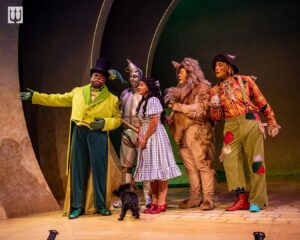
I’m not sure what I was expecting when I went to The Carleton in Halifax to see Ian Sherwood and Luke McMaster play on February 5th, but hearing a new song co-written with Lamont Dozier (of Holland-Dozier-Holland who wrote the 1965 hit “”I Can’t Help Myself (Sugar Pie Honey Bunch)”) was certainly an exciting surprise.
Luke McMaster is a singer-songwriter from Brandon, Manitoba currently based in Toronto who has a long and illustrious career spanning back to the mid 1990s. His most recent project, Icons of Soul, is an album and prospective documentary series that sees him and producer-musician-songwriter Arun Chaturvedi collaborating with various iconic songwriters of the R&B musical canon in the creation of new music and collecting stories from the lives and careers of these icons. The First Volume of the project includes two songs co-written with Lamont Dozier and Felix Cavaliere at their Nashville and Las Vegas homes respectively. The seed of this idea was planted by Leeds Levy, who made the call that connected McMaster with Cavaliere and Dozier, and the two are continuing to work toward further collaborations. Cynthia Weil and Barry Mann, Smokey Robinson and Stevie Wonder are among their Wishlist.
McMaster, who was accompanied in his set by Chaturvedi, sang “Soul Love,” co-written with Cavaliere (of The Young Rascals), which sounds like it could have been both written and recorded in 1965; McMaster’s smooth voice lends itself beautifully to the genre. It’s a song that feels immediately familiar, and has a beat that is nearly impossible not to at least bop along with it. The hook of the chorus is very catchy and repeated often, and the lyrics in the first verse conjuring kite imagery are quite poetic. “I Hate to See You Go” was co-written with Lamont Dozier and is inspired by the same source as “I Can’t Help Myself”: Dozier’s flirtatious grandfather, who used to call ladies “Sugar Pie,” and “Honey Bunch,” and who used to say (of his grandmother) that he hated to see her go, but that he loved to watch her leave. This song feels a little more contemporary, it also has an infectious beat and chorus hook and is a great showcase of McMaster’s beautiful voice. Dozier’s grandfather’s comment suggests a reference to a woman’s backside, but Dozier and McMaster maintain the cheekiness (sorry) of his comment, but, thankfully, also gives some more depth and sweetness to the relationship in the lyrics, which elevates the phrase from being purely a commentary on the female body and shifting focus toward the anticipation of the “hello again” inherent in the goodbye. “My Life is a Song,” also co-written with Dozier, who is also featured on the track, is a love song to music. Musically, it cleverly alludes to “I Can’t Help Myself” at times, and it is the most lyrically complex of the three songs McMaster sang from Icons of Soul. It is joyful and empowering and emphasizes the universality and communal power of music. It beautifully captures the essence of McMaster’s project, which sees people coming together from different countries, backgrounds, experiences, ethnicities and generations, united together by the love of Rhythm and Blues, and the music’s ability to reach out across the societal divides and to connect ardently to people in a visceral and enduring way.
McMaster also covered “Groovin’” (1967, The Young Rascals written by Felix Cavaliere and Eddie Brigati) and a Supreme’s Medley, which are both also featured on Icons of Soul ,as well as “How Sweet It Is (To Be Loved By You),” (Marvin Gaye, 1965), “Signed, Sealed, Delivered, I’m Yours” (Stevie Wonder, 1970) and (Sittin’ On) the Dock of the Bay (Otis Redding, 1967), which will perhaps be on the next instalment. They all suit McMaster’s voice dreamily. He also sang “Thank You,” a 2000 hit song from his time in the Canadian “boy band” McMaster and James. They opened for both NSYNC and Christina Aguilera’s Canadian dates the same year. In 2000 I was fifteen and I never listened to contemporary pop music on purpose (I was really into the 1987 Original Broadway Cast of Into the Woods at the time), but as soon as McMaster started singing it, I was immediately transported back to Grade 10 in a powerful subconscious sort of way. The song has all the qualities one would associate with the music of The Backstreet Boys or NSYNC, which makes even just the sound of it deeply and immediately nostalgic for older Millennials like me, regardless of whether or not you ever recorded the song off the radio, listened to it on your Discman, or downloaded it illegally from Napster at the time. I especially loved one of McMaster’s newest hit songs “Good Morning, Beautiful” (2013), which reached #3 on the US Billboard AC Radio Chart and stayed there for two weeks in December of that year, and features Grammy Award Nominee Jim Brickman. It’s a beautifully constructed pop song about how sometimes the love of someone else can make anyone a “morning person.” It is so upbeat and charming, I recommend listening to it first thing when you wake up, it might make it easier for you to get out of bed and feel empowered to tackle your day.

I was more familiar with Ian Sherwood’s set, as he has performed at the Lunasea Carols in the Cathedral and was featured last summer in Neptune Theatre’s The Argyle Street Kitchen Party. Sherwood is a singer-songwriter based in Halifax. He is a two-time winner of the Music Nova Scotia Musician Of The Year Award and a 2017 Robert Merritt Award winner for Outstanding Original Score. One of the defining features of Sherwood’s set is his clever and resourceful use of a looper. This means that Sherwood can set down a piece of music, say on the saxophone, or a bit of vocal harmony, and then he can play the recorded tracks on a repeated loop on top of one another, so he is able to build the different musical layers of his show in front of the audience. Sherwood plays the guitar, tambourine, saxophone and the piano at different points during the show, but, as he points out, it’s impossible to play the saxophone and to sing at the same time, so the looper allows for him to both accompany himself and to harmonize with himself, without sacrificing at all the live element of performance. He is also bringing the audience along into a deconstruction of his records, so we are better able to see how the music is layered to achieve the final sound. At the Carleton he was also joined by musicians Chris Kirby and Arun Chaturvedi and Becca Guilderson (backing vocals), which added even more to the lushness of the sound.
Sherwood began with “Non Believer,” from his 2014 album Everywhere To Go. It is a sort of subversive gospel song, musically it finds a clear bridge between folk music and the soulful devotionals often associated with Southern African American churches. Lyrically, however, the songs devotes itself to the love of woman who is not a Believer, who has a free spirit and a complexity to her life, but with whom the song’s storyteller may provide a measure of stability and comfort. It is a beautiful and evocative mixture of form and content, and the lyrics suggest that this is just one piece of a much more intricate love story. He followed this with the slower and more somber “Firefly,” more firmly rooted in the acoustic folk genre, from his 2017 album Bring in the Light. It’s a beautiful song that speaks to a person who has had his own experiences, who has grown, learned, struggled, been self sufficient, and self reliant, and who has walked for miles by the light of the firefly, on his own, a man who isn’t looking for someone to “complete him,” or take care of him, but instead for someone, presumably with a past as rich and a life as fully formed as his own, who has been just as self sufficient, to join him, so together they can find a sense of home. “Me Or Your Money,” also from Everywhere To Go, has a definitive Blues influence, a playful and catchy tune that turns the concept of gold-digging on his head, in that you can’t be taken advantage of in that way if you’re broke. “Cape town,” from Sherwood’s 2010 album And Now the Fun Begins especially showcases Sherwood’s prowess as a storyteller. His lyrics are beautifully poetic and wistful and he paints evocative imagery of a dissolution of a relationship across the distance that was doomed from the beginning. Lines like, “And it’s funny how a window pane, Can be as loud as a hurricane. When you’re screaming at your own face, Through the tears, through the rain” hit right at the heartstrings.
Sherwood moved seamlessly to the piano for “Fireman’s Ball,” another stunning bit of lyrical poetry from Everywhere To Go. This song is especially glorious at showing off Sherwood’s gorgeous voice, which is so full of emotional depth and a compelling, comforting, sense of warmth. His one cover song of the evening was “O Mary Don’t You Weep” (featured on Bruce Springsteen’s We Shall Overcome: The Seeger Sessions in 2006), a really interesting layering of genres, influences and experiences that complimented the show’s double bill with McMaster and McMaster’s work with Dozier and Cavaliere. “The Short End of the Stick,” another of Sherwood’s gospel-infused songs also created a natural connection between his set and McMaster’s. “Colour Me With Love,” which Sherwood has yet to record, features a banquet of saxophone (via the looper pedal) and is one of my favourite of his songs, especially the Doo-wop falsetto dream that is the ending, which can be best described as the emoji of the smiley face with hearts for eyes.
Sherwood ended his set with his singalong song “We Are Not Alone,” which I bought after The Argyle Street Kitchen Party and listened to on repeat for weeks. It’s an extremely charming and catchy portrait of the ephemeral nature of youth, love and tranquility, but also how in youth, in love, and in tranquillity we become aware of how beautifully interconnected we are to those around us.
Sitting in the small, but beautifully newly renovated, Carleton, one of the oldest buildings in Halifax, listening to music by Sherwood that is deeply rooted in our city’s musical tradition and new music by McMaster and Dozier that harkens back fifty years to Detroit and is deeply rooted in a completely different musical tradition, that sense of interconnectivity, of the world being smaller than one thinks, and the ability music has to be that bridge, feels really heightened and special.
Ian Sherwood’s music is available for purchase from CD Baby HERE. iTunes. Spotify. Visit his website for Tour Dates.
You can follow Ian on Social Media: Facebook. Twitter. Instagram (@iansherwood). YouTube.
Luke McMaster’s music is available for purchase HERE. iTunes. Spotify. Visit his website for Tour Dates.
You can follow Luke on Social Media: Facebook. Twitter. Instagram (@lukemcmaster). YouTube.






